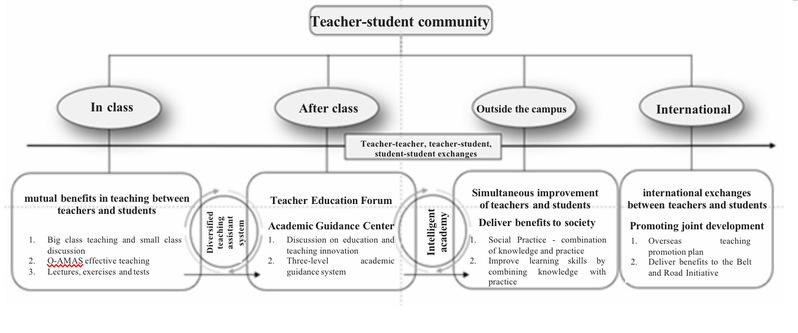Undergraduate Academics
Nankai University actively builds and develops a professional system that meets the demands of economic and social development and talent training in the 21st century. In the long-term, it has formed the features of equal emphasis on liberal arts and science, profound foundation, and highlighted application and innovation. At present, Nankai University has 16,372 undergraduates, 26 professional colleges, 92 undergraduate majors, of which 58 are humanities and social sciences majors and 34 are science, engineering and medicine majors, covering 10 disciplines, that is, philosophy, law, economics, literature, history, science, engineering, medicine, management, and art.
Core Values
Putting 'cultivating talent' on the top priority
Undergraduate education is the foundation of Nankai University. After years of exploration and practice, Nankai University has gradually established an undergraduate education and teaching model aimed at implementing the core value of talent training. The reform centers on education and teaching adheringe to educating people first, takes teaching as a top priority, strengthens the consciousness of excellence, quality, and innovation of undergraduate education, and continuously improves the system and mechanisms of talent training. Education and teaching are guided by policies. The university attaches great importance to enhancing independent learning skills and achieving all-round development of the students, and ensuring the implementation of the “Three in one” education model of “classroom teaching, campus culture, and social practice” and the “Three all” education mechanism of “all the personnel, all procedures, and all dimensions”. Talents serve as the major pillars underpinning education and teaching. The teachers' consciousness of teaching and education and professional teaching abilities are improved through the establishment of the human resources management mechanism covering training, development, promotion, evaluation, and incentives, etc. Scientific research facilitates education and teaching. The teachers are guided to integrate cutting-edge knowledge and scientific research and innovation achievements into teaching. In doing so, the outstanding results can support teaching and promote the combination of teaching and research. Management guarantees education and teaching. The scientific and effective teaching quality monitoring and regulatory mechanism and evaluation mechanism of students’ development is established to improve the validity of the education and teaching quality guarantee system.
Strategic Initiatives
Launching “Quality Improvement of Nankai University First-class Undergraduate Education Action (2019-2021) ”
"Nankai 40 Measures" focuses on the three transformations of quality education of dedication to public interests and acquisition of universal capability and proposes “one, two, three and four” reform ideas: one mainline - dedication to public interests and acquisition of universal capability and innovation ability; two main bodies - teachers’ enthusiasm and students’ initiative; three starting points - main body coordination, evaluation incentives, quality culture; and four breakthroughs - training model, practical teaching, international exchanges as well as intelligent teaching.
Given the major difficulties in the development of first-class undergraduate education in Nankai University, 40 innovative measures were introduced in terms of ten aspects, adopting a wide range of combined measures for the undergraduate education reform in Nankai University. First, integrate ideological and political education into general undergraduate education. Second, improve the design of the education system and encourage teaching reform and innovation. Third, enhance the general education system by promoting students’ all-round development. Fourth, build a diversified and characteristic cultivation system of talents. Fifth, create a teacher-student community that takes learning as the mainstay and allows teachers and students to boost one another. Sixth, improve teachers’ teaching skills in an integrated manner. Seventh, push the deep integration of modern information technologies and education. Eighth, expand international cooperation on education in an all-round way. Ninth, strengthen experiment and practice teaching, encourage the education model driven by innovation and entrepreneurship. Tenth, elevate cultural development towards first-class undergraduate education.
Innovative Teaching &Learning Programs
Creating a “teacher-student community” that takes learning as the mainstay and allows teachers and students to boost one another
Nankai University regards the “teacher-student community” as a teaching philosophy. In terms of main bodies, it sets store by the mutual teacher-teacher, teacher-student, and student-student exchanges. In terms of space, it strives to create the “teacher-student community” in and after the class, inside and outside the university, and even at home and abroad. In terms of the network environment, it explores the online academy that is composed of interdisciplinary teachers and students, that is, the intelligent academy, to further widen the communication channels of the “teacher-student community”.
Strengthen teacher-teacher exchanges and carry out innovative teaching research and design.
Build a “teacher-student community” within the curriculum. Also, it remains committed to promoting TEAL interactive teaching and allows teachers and students to boost one another.
Establish a diversified teaching assistant system to regulate the teaching assistant training process and define relevant evaluation standards.
Build a “teacher-student community” outside the classroom and a three-level school-college-class academic guidance system.
Put an academic platform in place, which can deliver benefits to the teacher-student community. In addition, the academic platform is named the Intelligent Academy.
Create a teacher-student community outside the campus, and improve learning skills by combining knowledge and practice.
Build an international teacher-student community to facilitate its Global Nankai plan.

Evaluation System
Maintaining a comprehensive and multi-level teaching quality evaluation system
The university-level and college-level supervision teams are set to be established. An applet for teaching assessment by graduates is set to be developed. And a comprehensive, three-dimensional, and multi-dimensional teaching quality evaluation system in which supervision experts, leaders in the university, managerial staff, and students work together, and covers all colleges and teaching activities is set to be established, forming an all-around, whole-process and continually improving closed-loop quality monitoring mechanism.
Front cover photo by Song Quanchao









